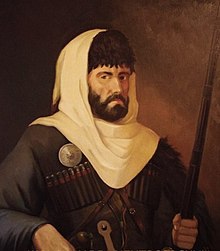Shuaib-Mulla of Tsentara
Shuaib-Mulla of Tsentara (Chechen: Цонтароин ШуӀайб-Молла; Russian: Шоип-Мулла Цонтороевский) was Chechen commander and naib in the Caucasian Imamate during the Caucasian War, he was one of Imam Shamil's closest associates, he was nicknamed the "Marshal of the forests" for his skill in guerrilla warfare by Count Pavel Grabbe.[1]
Shuaib-Mulla of Tsentara | |
|---|---|
 | |
| Nickname(s) | Marshal of the forests |
| Born | 1804 Biltaul, Aukh |
| Died | March 1844 Tsentaroi, Chechnya, Caucasian Imamate |
| Allegiance | |
| Battles/wars | Caucasian War Battle of Ichkeria |
Biography
Shuaib was born in the village of Biltaul(modern Tukhchar of the Novolaksky district of Dagestan) in 1804 into the family of the scientist Muhammad-Hadji. Muhammad-mullah was not only a prominent Arabist scientist, educator, but also is also reported to have enjoyed great respect and authority among the Chechens, for a long time he headed the Chechen national council(Mekhkan Khel) in Nokhch-Mokhk.[1]
In his youth, Shuaib received a good education and showed a great aptitude for science. In addition to his native Chechen, Shuaib is reported to have spoken Arabic, Kumyk and Avar.[1]
Shuaib's father Muhammad initially wanted his son to study sciences, and at first Shuaib was aimed at deep study of sciences. For some time he worked as a mullah. However, the outbreak of the Caucasian War changed his plans. At the onset of the Caucasian war, he became one of the most active participants in the active resistance against the Russian Empire. In 1829 Shuaib became a murid and an active assistant to the first imam of the Caucasian Imamate Ghazi Muhammad. However, after his death, Shuaib retires from active military activities. From 1834 Shuaib served as a mullah in the village of Aku-Yurt for 4 years. The tsarist command did not forgive him for active participation in the military campaigns of Imam Gazi-Muhammad and began taking measures to kill him or win him over by promising all kinds of benefits and positions. Shuaib rejects any proposals from the authorities. To avoid arrest, in 1838 he fled to the mountains of Ichkeria, where he became an associate of Sheikh Tashev-Khadzhi.[1]
Pioneership in the field of forest warfare
The Chechens, in the opinion of many researchers, were the first employ the tactic creeping troops, brought up exemplary mountain cavalry with such truly immortal examples as Kazbich, Beibulat, Talhig, laid the foundation for horse-mountain artillery and invented "nomadic batteries." They created a "blockage" of the enemy - the prototype of an infantry trench and fortified point, and deeply thought out the theory of an elastic front. All this then arose with Totleben in Sevastopol and Baklanov in Poland, but it was never studied in full. Europe marveled at the Cossacks and studied, forgetting or not knowing that it was not the primary source of the methods of partisan warfare, the researcher writes. - So, for example, the war of dispersion, brilliantly carried out by one of the most talented commanders of the Imamate, Shoip-Molloy Tsontoroisky, still remains unexplored. With surprising completeness, it surpassed what the modern theory of small war came to almost a century later.
— Nikolai Alexandrovich Smirnov, Muridism in the Caucasus
.
- "Шуаиб-мулла Центороевский – сподвижник Шамиля". ИА Чеченинфо (in Russian). Retrieved 2020-07-24.